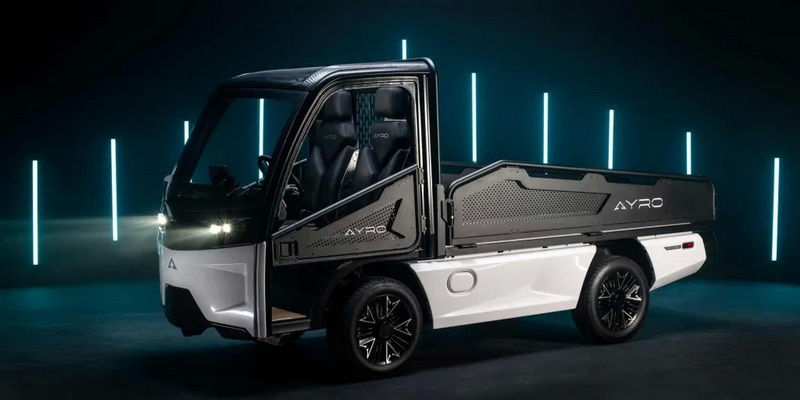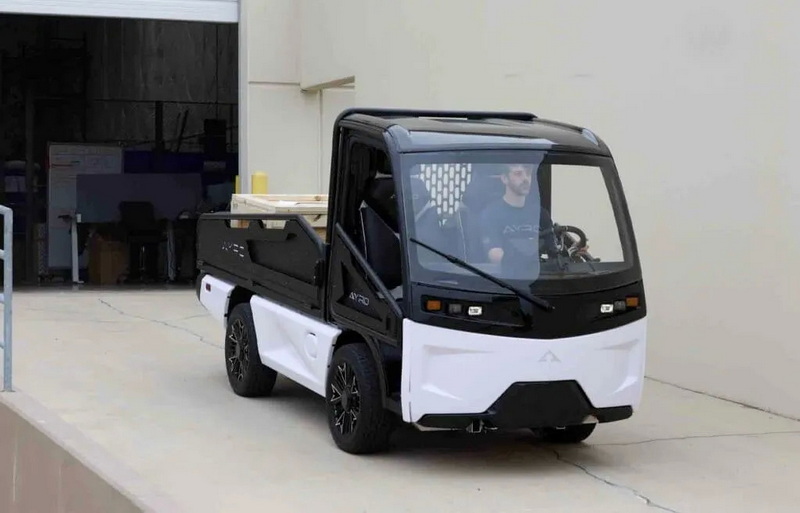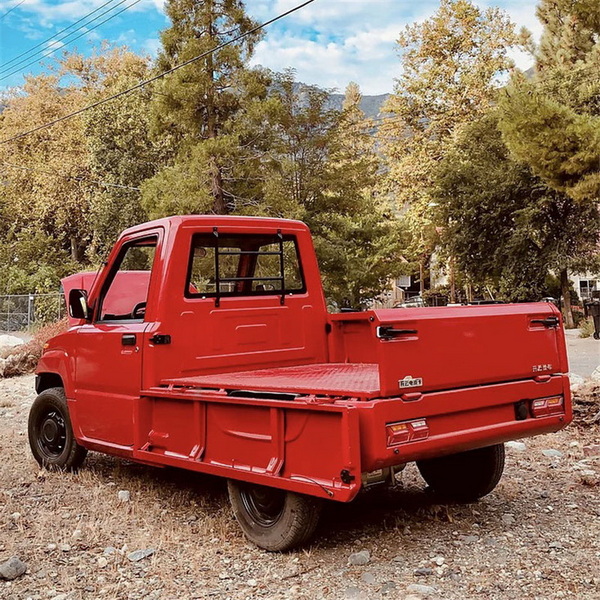Content Menu
● Introduction to Electric Mini Trucks
>> Advantages of Electric Mini Trucks
● Current Trends in Electric Mini Trucks
>> Joint Ventures and Collaborations
>> Technological Innovations
>> Market Expansion
● Future Developments
>> Enhanced Battery Technology
>> Autonomous and Connected Technologies
>> Sustainable Materials and Design
>> Government Incentives and Regulations
● Key Players and Models
>> TELO MT1
>> Tata Ace EV
>> ChangLi EV Mini Pickup
● Challenges and Opportunities
● Market Dynamics and Consumer Behavior
● Conclusion
● FAQ
>> 1. What are the primary advantages of electric mini trucks?
>> 2. Which companies are leading the development of electric mini trucks?
>> 3. What technological advancements can we expect in electric mini trucks?
>> 4. How will government policies impact the electric mini truck market?
>> 5. What are some of the challenges facing the electric mini truck market?
The electric vehicle (EV) market is rapidly evolving, with significant advancements in technology, design, and sustainability. Among these developments, electric mini trucks have emerged as a promising segment, offering a blend of efficiency, practicality, and environmental friendliness. This article explores the future developments expected in electric mini trucks, highlighting key trends, innovations, and market shifts.
Introduction to Electric Mini Trucks
Electric mini trucks are compact, versatile vehicles designed for urban and suburban environments. They are ideal for last-mile delivery services, small businesses, and personal use, providing a sustainable alternative to traditional gas-powered trucks. These vehicles typically feature advanced battery technology, efficient powertrains, and customizable designs to suit various applications.

Advantages of Electric Mini Trucks
1. Environmental Benefits: Electric mini trucks produce zero tailpipe emissions, contributing to cleaner air quality and reduced carbon footprints.
2. Cost Efficiency: Lower operating costs due to reduced fuel expenses and minimal maintenance needs.
3. Maneuverability: Compact size allows for easy navigation in congested urban areas.
Current Trends in Electric Mini Trucks
Joint Ventures and Collaborations
Major automotive companies like Suzuki, Daihatsu, and Toyota are collaborating to develop mini-commercial van electric vehicles, aiming for a release in fiscal 2025. This joint effort combines Suzuki and Daihatsu's expertise in small-size cars with Toyota's advanced electrification technology, focusing on efficient last-mile logistics. Such collaborations not only enhance the technological capabilities of these vehicles but also expand their market reach through shared resources and expertise.
Technological Innovations
Companies like TELO are pioneering the development of electric mini trucks with innovative designs and functionalities. The TELO MT1, for instance, offers a compact footprint similar to a Mini Cooper but with impressive cargo capacity and off-road capabilities. This model showcases how electric mini trucks can cater to diverse needs, from urban delivery services to rural utility tasks.
Market Expansion
The electric mini truck market is expanding globally, with brands like Tata and E Trio offering models in India. These vehicles are gaining popularity due to their eco-friendly nature and lower maintenance costs. In regions with dense urban populations, electric mini trucks are becoming essential for small businesses and personal users seeking efficient transportation solutions.
Future Developments
Enhanced Battery Technology
Advancements in battery technology will play a crucial role in the future of electric mini trucks. Expectations include longer ranges, faster charging times, and more efficient energy storage systems. Solid-state batteries, for example, promise to significantly improve safety, durability, and performance compared to traditional lithium-ion batteries. This shift towards more advanced battery technologies will enable electric mini trucks to compete more effectively with their gasoline-powered counterparts.
Autonomous and Connected Technologies
Integration of autonomous and connected technologies will enhance safety, efficiency, and user experience. These features will enable real-time monitoring, optimized routing, and improved vehicle-to-everything (V2X) communication. Autonomous capabilities can also automate delivery processes, reducing labor costs and increasing delivery speed. Additionally, connected technologies will facilitate seamless integration with smart city infrastructure, further enhancing the utility of electric mini trucks.
Sustainable Materials and Design
Future electric mini trucks will likely incorporate sustainable materials and design principles, focusing on recyclability, reduced weight, and enhanced aerodynamics to improve efficiency and reduce environmental impact. The use of lightweight materials such as aluminum and carbon fiber can significantly reduce the overall weight of the vehicle, thereby improving its range and efficiency. Moreover, designs that emphasize recyclability will help minimize waste and support a circular economy.
Government Incentives and Regulations
Governments worldwide are implementing policies to encourage the adoption of electric vehicles. Incentives such as tax credits, subsidies, and emission regulations will continue to drive the growth of the electric mini truck market. For instance, countries like Norway and the Netherlands offer substantial tax incentives for EV buyers, which has led to a significant increase in EV adoption rates. Similarly, emission standards in cities like London and Paris are pushing companies to adopt cleaner transportation options, further boosting demand for electric mini trucks.

Key Players and Models
TELO MT1
The TELO MT1 is a groundbreaking electric mini truck designed for urban utility and off-road capability. It features a compact design with impressive functionality, making it an attractive option for both businesses and individuals. The MT1's versatility in handling various terrains and tasks positions it as a leader in the electric mini truck segment.
Tata Ace EV
Tata's Ace EV is a popular electric mini truck in India, known for its payload capacity and affordability. It is designed for last-mile delivery services and small businesses. The Ace EV's success in India highlights the potential for electric mini trucks in emerging markets where cost-effectiveness and practicality are key considerations.
ChangLi EV Mini Pickup
The ChangLi EV Mini Pickup offers a budget-friendly option with basic features suitable for light-duty applications. It is popular among small businesses and personal users who require a reliable and eco-friendly vehicle for daily tasks. The ChangLi model demonstrates how electric mini trucks can cater to diverse user needs across different markets.
Challenges and Opportunities
Despite the promising outlook, the electric mini truck market faces challenges such as infrastructure limitations, high upfront costs, and competition from established brands. However, these challenges also present opportunities for innovation and growth. For instance, the need for better charging infrastructure can drive investment in smart charging solutions and public-private partnerships to expand charging networks. Additionally, the high upfront costs can be mitigated by offering financing options and highlighting the long-term cost savings of electric vehicles.
Market Dynamics and Consumer Behavior
Consumer behavior is shifting towards more sustainable and environmentally conscious choices, which is driving demand for electric vehicles. The appeal of electric mini trucks extends beyond their eco-friendly credentials; they also offer practicality and cost efficiency, making them attractive to a wide range of consumers. As consumers become more aware of the benefits of electric vehicles, the market is likely to see increased adoption rates.
Moreover, market dynamics are influenced by government policies and technological advancements. As governments set stricter emission standards and invest in EV infrastructure, companies are incentivized to develop more competitive electric models. This interplay between policy, technology, and consumer demand will continue to shape the electric mini truck market in the coming years.
Conclusion
The future of electric mini trucks is promising, with significant advancements in technology, design, and sustainability. As the market continues to evolve, we can expect to see more efficient, affordable, and environmentally friendly options available for both commercial and personal use. The integration of autonomous and connected technologies, along with enhanced battery capabilities, will further enhance the appeal of these vehicles. With ongoing support from governments and growing consumer interest, electric mini trucks are poised to play a crucial role in transforming urban transportation.

FAQ
1. What are the primary advantages of electric mini trucks?
- Electric mini trucks offer several advantages, including environmental benefits, cost efficiency, and maneuverability. They produce zero tailpipe emissions, reducing carbon footprints and air pollution. Additionally, they have lower operating costs due to reduced fuel expenses and minimal maintenance needs. Their compact size allows for easy navigation in congested urban areas.
2. Which companies are leading the development of electric mini trucks?
- Companies like Suzuki, Daihatsu, and Toyota are leading the development of electric mini trucks through collaborative efforts. Other notable players include TELO and Tata, which are innovating in design and functionality.
3. What technological advancements can we expect in electric mini trucks?
- Future technological advancements include enhanced battery technology for longer ranges and faster charging, integration of autonomous and connected technologies for improved safety and efficiency, and the use of sustainable materials and design principles.
4. How will government policies impact the electric mini truck market?
- Government policies, such as tax credits, subsidies, and emission regulations, will continue to drive the growth of the electric mini truck market by incentivizing adoption and penalizing non-compliance with environmental standards.
5. What are some of the challenges facing the electric mini truck market?
- The electric mini truck market faces challenges such as infrastructure limitations, high upfront costs, and competition from established brands. However, these challenges also present opportunities for innovation and growth in the sector.










































